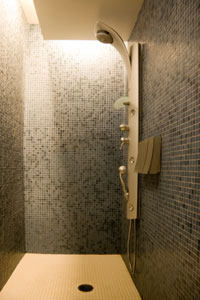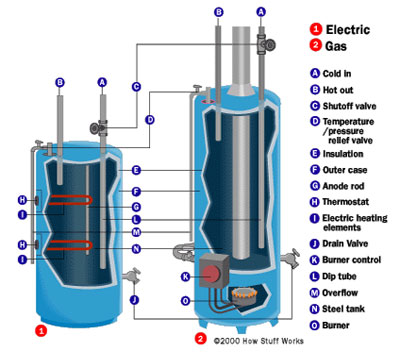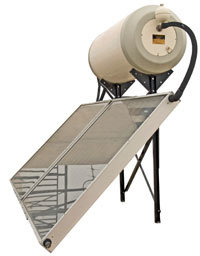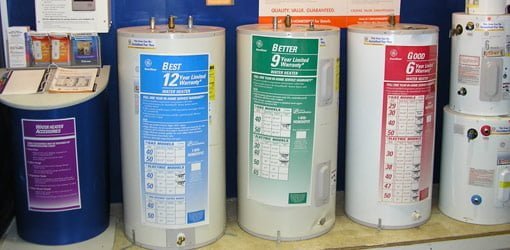Do It Yourself Tankless Water Heaters Installation With Recirculating Pump
How to Choose a New Water Heater
It’s the dead of winter, freezing cold outside, and you seek comfort in the piping hot confines of your morning shower. With the lights dimmed, the water hits your face and rolls over your shoulders. Your muscles relax one by one as the warmness of the water finds its way down your legs to your chilly, restless feet. Lathered with soap and shampoo, you slump against the warming tile, eyes closed. You consider falling back asleep standing fully upright when it happens — a sudden burst of ice cold water hits your chest like acid rain. You crank the cold water down to zero with no result. The water temperature has turned against you, refusing heat in a stubborn show of determination. The cruel reality hits you — your water heater has just bought the farm.
A visit to your local big-box home-improvement store is overwhelming, to say the least. You’re faced with too many brands and too many sizes to choose from. Different fuel sources and energy ratings confuse you. And what’s the deal with these heaters that don’t even have a tank? How on earth can they meet your needs? Unfortunately, your big-box home-improvement employee helps you none — you’re going to have to figure
Electric – uses large coils that hang down into the tank to heat the water. The coils are similar to the ones in an electric oven. Generally, electric water heaters aren’t as efficient as those powered by other fuel sources, and electricity is more expensive than natural gas or propane. However, they’re less expensive up front and don’t require venting. If your water demand is small, then it may be a good way to go.
Natural Gas – uses a gas burner at the bottom of the tank, with a venting chimney that runs through the center and out the top. The carbon dioxide and water vapor byproducts are vented through the chimney and then run outdoors through your house chimney or side wall vent. A gas pilot light or electric spark produces the flame. Natural gas models cost more than electric heaters but are more efficient to operate.
Propane – works in the same way as a natural gas, but uses propane as the fuel source. Propane is generally used as a fuel source when a home doesn’t have access to natural gas. The propane is supplied from a large tank on the property.

HOW TO CHOOSE A WATER HEATER
Heating water is the second largest single user of energy in the home. While we all enjoy a soothing hot shower, rising energy costs—along with their adverse environmental impact—make it a good time to take a closer look at the various options now available.
Storage Tank: The most common hot water system used in homes. Water is kept constantly heated in the storage tank by electricity, natural gas, oil, or propane. Hot water is drawn out of the top of the tank when a faucet is turned on and cold water flows in the bottom to replace it.
Tankless: Also known as on demand water heaters. Water is heated by electricity or gas when the water flows through it without the need for a tank.
Solar: Water is circulated from the tank through a solar collector where it is heated by the sun. If the water in the tank is not hot enough, a conventional water heater is used to bring it up to the desired temperature
Factors in Choosing a Water Heater
So which type of water heater is right for your home? There are several factors to consider including the price of the system and installation, the cost and availability of energy sources, the energy factor (EF) rating of the water heater, and whether the system meets new water heater regulations.

Water Heater Buying Guide
Purchasing a Water Heater
Whether you’ve just taken that first unexpected and unwelcome cold shower or simply wish to reduce your energy bill, purchasing a new water heater can be an intimidating process
Fuel Source
First, determine what type of fuel source you have in the home. Once you know the fuel source, it’ll be easier to choose a water heater to fit your needs. Here are the differences among electric, gas/propane and hybrid fuel types.
Types of Water Heaters
Consider the size of your family and the utilities in your area to choose the best water heater.
Storage Tank
This is the most common type of water heater. These units have an insulated tank where water is heated and stored until it’s needed. They’re available in electric, liquid propane (LP) and natural gas models. Natural gas and LP water heaters normally use less energy and are less expensive to operate than electric models of the same size. When you buy a water heater, look at its cited energy efficiency and yearly operating costs. This information can be found on the EnergyGuide label.
Tankless or On-Demand
They don’t store hot water; they heat water as it passes through a series of coils in the unit. Since the unit only heats water as you use it, a tankless heater is usually more energy-efficient than a traditional storage tank water heater. They’re available in electric, LP and natural gas models. A tankless unit can provide only a limited flow rate of hot water. Most tankless units can provide up to 3.5 gallons of heated water per minute. These units are a good choice for anyone whose demand doesn’t typically call for hot water at more than two points at a time.

How to choose the right water heater
Tank water heater or tankless water heater? Here is a primer to help you in making the right choice Water heaters are a basic necessity to help in extreme weather conditions. They are the most sought after home equipment for any household. While traditional water heaters are huge in size and consume high energy, there modern counterparts are energy efficient in nature and produce hot water as per need.
Tank water heater
They come in two variants -gas or electric. The tank is insulated to help keep the inner water warm, and a thermostat to control the overall temperature of the water.
Tankless water heater
Tankless Water Heaters are comfortable, energy efficient and convenient. They can provide endless supply of hot water as per one’s need. But the question remains which one to choose – tank water heater or tankless water heater? Here is a primer to help you in making the right choice.
Energy efficiency
The modern tankless water heaters are much more energy efficient than the traditional ones. A tankless water heater heats water only at the time it is being used. Therefore, the energy is consumed only at the time when the heater is on. On the other hand, in the traditional water heater setup, water is stored in a large tank. When the water in the tank cools off, the fuel kicks in and heats it up again. An energy efficient water heater saves your money on electricity bill every month. Before buying a water heater, look for one with a higher energy factor. The cost of tankless water heaters are little higher than their non-energy efficient counterparts but the energy and the savings in future can make up for the initial higher price. Upgrading to a tankless water heating system is a good decision considering the long-term environmental benefits these water heaters provide.
Space matters
A conventional water heater is bulky in size which takes up a good amount of space of your house. The unit needs a moderately large space for installation. On the other hand, tankless water heater contributes towards space saving. It is compact in size and takes up significantly less space than a conventional tank.

Electric, Gas or Propane: How to Choose the Right Water Heater
Electric Water Heater
An electric water heater has the lowest initial cost and requires little maintenance. Venting is not necessary and there is no cause for worry regarding combustion gases. With electric models, the water heats rather quickly. They can offer high energy factor ratings even though gas-powered models operate with greater fuel efficiency.
Storage Tank Heater
The most commonly purchased water heater has a storage tank that constantly heats stored water for household usage. A thermostat detects water temperature and turns on the heating element when needed.
Recovery rate
The recovery rate is listed in terms of numbers of gallons of water heated per hour. It is recommended to select a higher recovery rate for systems that have higher hot water demands
Unit dimensions and installation location
It is likely that a new hot water heater will be larger than an older, replaced model because there is now more insulation built into the storage tank walls. You will have to make sure that you have enough space to install it.
To select the right size tank, you need to plan the amount of water needed for the number of bathrooms, bedrooms, and occupants in the home